外研版 必修一 Module 1 My First Day at Senior High Module 1 Grammar课件(37张)
文档属性
| 名称 | 外研版 必修一 Module 1 My First Day at Senior High Module 1 Grammar课件(37张) |
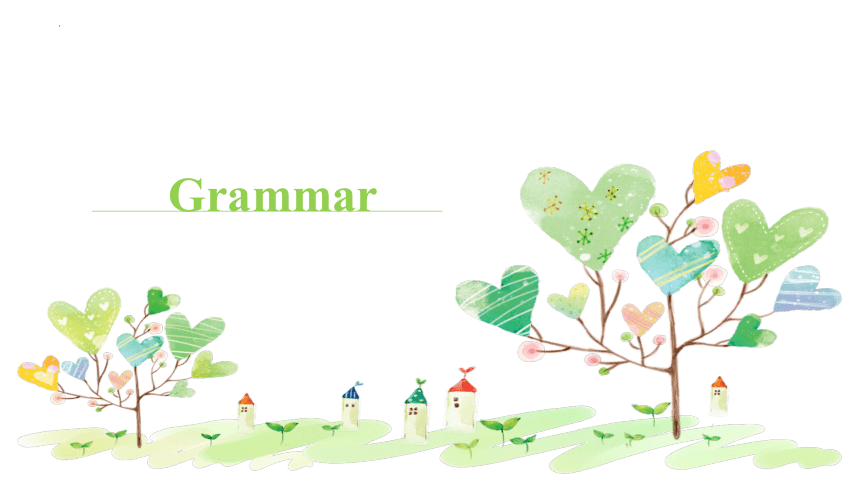
|
|
| 格式 | zip | ||
| 文件大小 | 2.3MB | ||
| 资源类型 | 教案 | ||
| 版本资源 | 外研版 | ||
| 科目 | 英语 | ||
| 更新时间 | 2022-07-27 00:00:00 | ||
图片预览





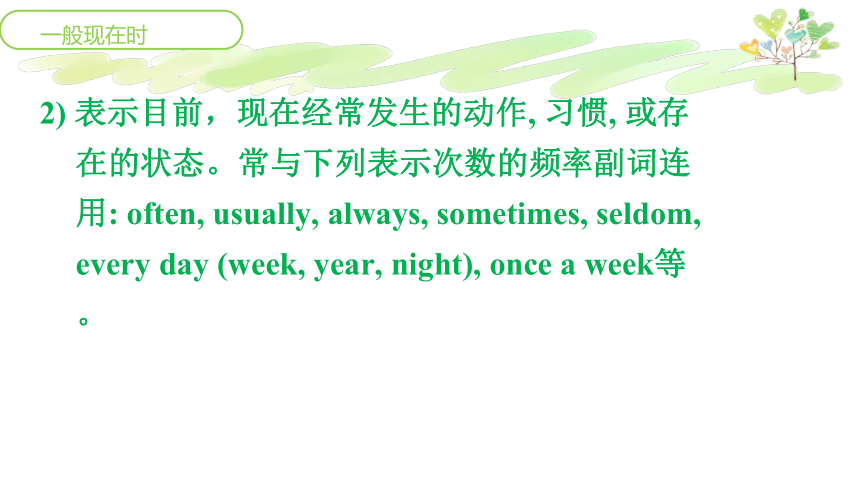
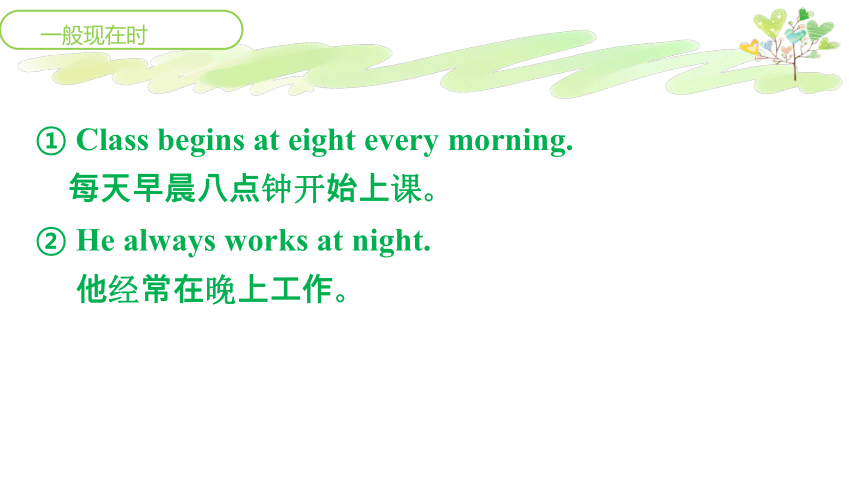
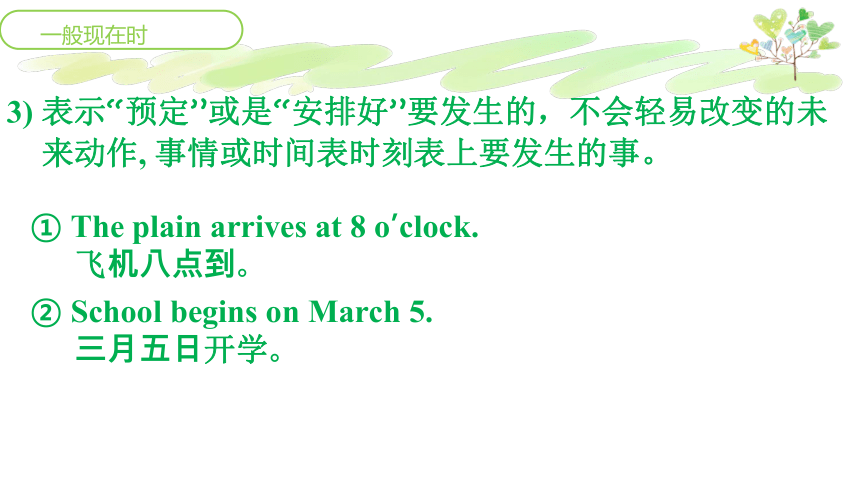
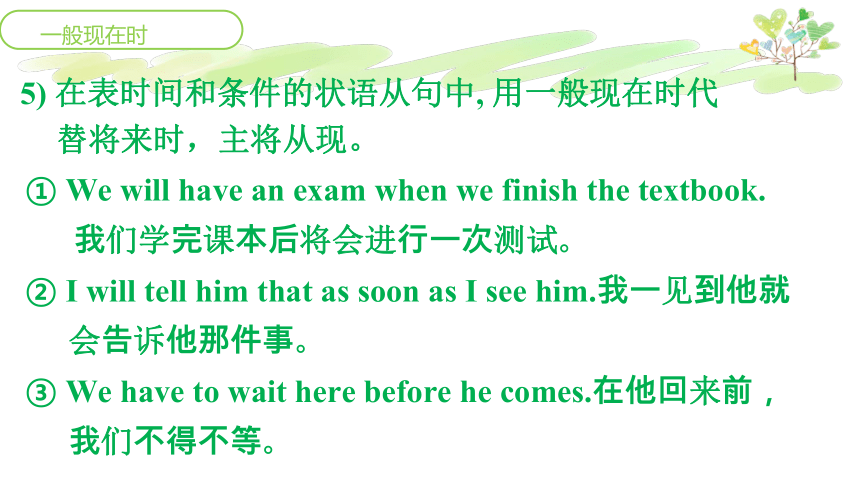



文档简介
(共37张PPT)
Grammar
一般现在时和现在进行时
一般现在时
一般现在时
输入文字输入文字
输入文字输入文字
输入文字输入文字
输入文字输入文字
输入文字输入文字
延迟符
(1) 一般现在时的句型结构
①肯定句: 主语+ am/is/are+表语
主语+实义动词 (+其它)
②否定句: 主语+ am/is/are +not+表语 主语+don’t (doesn’t) +实义 动词原形 (+其它)
③疑问句: Am/Is/Are+主语+表语 Do (Does)+主语+实义动词原形(+其它)
一般现在时
添加标题
(2)一般现在时的用法
1) 表示不随时间的变化而变化的事实, 真理,格言,警句等。
① The earth goes around the sun. 地球绕着太阳转。
② Practice makes perfect. 熟能生巧。
③ Tomorrow is Monday. 明天星期天。
一般现在时
2) 表示目前,现在经常发生的动作, 习惯, 或存在的状态。常与下列表示次数的频率副词连用: often, usually, always, sometimes, seldom, every day (week, year, night), once a week等。
输入标题
输入标题
输入标题
一般现在时
① Class begins at eight every morning.
每天早晨八点钟开始上课。
② He always works at night.
他经常在晚上工作。
一般现在时
3) 表示“预定”或是“安排好”要发生的,不会轻易改变的未来动作, 事情或时间表时刻表上要发生的事。
① The plain arrives at 8 o’clock. 飞机八点到。
② School begins on March 5. 三月五日开学。
一般现在时
5) 在表时间和条件的状语从句中, 用一般现在时代替将来时,主将从现。
① We will have an exam when we finish the textbook.
我们学完课本后将会进行一次测试。
② I will tell him that as soon as I see him.我一见到他就会告诉他那件事。
③ We have to wait here before he comes.在他回来前,我们不得不等。
I have been living outside Qingdao for a long time now but I__ back there every few weeks to see my parents. A. am going B. had gone
C. would be going D. go
(2) Give her the book when you ____.
will meet her. B. meets her
C. meet her D. meeting her.
(3) ----I want to write Yang Liwei a letter, but I don’t have any stamps.
----I’ll buy some for you, if I ___to the post office. A. go B. shall go
C. will go D. went
现在进行时
现在进行时
输入标题
输入标题
输入标题
输入标题
(1) 现在进行时的基本结构
① 肯定句: 主语+ am/is/are+ 现在分词
② 否定句: 主语+ am/is/are+ not+现在分词
③ 疑问句:Am/Is/Are +主语+现在分词
现在进行时
输入标题
输入标题
输入标题
输入标题
(2) 现在进行时的用法
1) 表示说话时正在进行的, 目前正在发生的动作。now, at the (very) moment, for the time being, at present, 及Look!, Listen!等词汇。
① Look! The big bird is flying away.
看, 那只大鸟正在飞走。
② He is watching a movie now.
他现在正在看电影。
现在进行时
输入标题
输入标题
输入标题
输入标题
2) 表示目前一段时间内正在进行, 但说话时可能没有进行的动作。
Right now I am studying Chinese by distance learning. 我现在正通过远程教育学习汉语。
现在进行时
输入标题
输入标题
输入标题
输入标题
3) 与always, constantly, forever, all the time等副词连用, 表示动作反复或习惯。此时句子常含有说话者的强烈情感在内。表达较强的“责备”或“表扬”之意
① You are always changing your mind.
你总是主意不定。 (太烦人了)
② He is always helping others.
他总是帮助别人。 (他真是个好人。)
1. —Do you like the material
—Yes, it _______ very soft.
A. is feeling B. felt
C. feels D. is felt
3. —When will you come to see me, Dad
—I will go to see you when you ______ the training course. A. will have finished B. will finish
C. are finishing D. finish
4. He always ______ careful notes while he is listening to the teacher in class.
A. will take B. took
C. takes D. is taking
5. I’m sorry I can’t go. I ____ a report.
A. write B. am writing
C. wrote D. was writing
6. —What’s the terrible noise
─The neighbors ______ for a party.
A. have prepared B. are preparing
C. prepare D. will prepare
7. I need one more stamp before my collection _____. A. has completed B. complete
C. has been completed D. is completed
8. ─ Can I join the club, Dad
─ You can when you ______a bit older. A. get B. will get
C. are getting D. will have got
9. There _______ the bus. Hurry up.
A. is coming B. comes
C. has come D. will come
10. If I ______ when he comes, wake me
up, please.
A. slept B. am sleeping
C. will be sleeping D. was sleeping
-ing分词和-ed分词用法
输入标题
输入标题
输入标题
输入标题
一、传统的观点许多参考书认为:
-ing形容词与表示事物的名词连用,
-ed形容词与表示人的名词连用。
此说法在很多情况下是可行的,但表述欠准确,在许多情况下却是不可靠的。如-ing 形容词用于人的情况就比比皆是:假若你的老师说话幽默、讲课生动,那么不仅他的课非常interesting,而且你会说他是一个 interesting man(有趣的人)。
输入标题
输入标题
输入标题
输入标题
比较:
I’m interested in interesting people.
我对有趣的人感兴趣。
He was worried about his worrying son.
他为他令人担忧的儿子感到担忧。
He was annoyed with the annoying person.
他对这个讨厌的人很生气。
输入标题
输入标题
输入标题
输入标题
另一方面,-ed 形容词用于指物的情况也不少见。
比较并体会:
a frightened look 害怕的表情(指带有这种“表情”的人感到害怕)
a frightening look 吓人的表情(指这种“表情”令人害怕)
an excited talk 心情激动的谈话(指“谈话”的人心情激动)
an exciting talk 令人激动的谈话(指听“谈话”的人心情激动)
输入标题
输入标题
输入标题
输入标题
由于传统的观点说得太绝对,有时做起题来还可能会因此掉入命题人的陷阱,请看下面一题 :
_____ do you think of your English teacher Is he _______?
What, interesting B. What, interested
C. How, interesting D. How, interested
此题考查两方面的知识点:一是考查what do you think of…与how do you like…的用法区别(两者搭配不同,但意思相同);二是考查interesting与interested的用法区别。若套用以上关于-ing形容词与-ed形容词的区别,则可能将答案锁定为D。但是错了,此题的最佳答案应是A。
输入标题
输入标题
输入标题
输入标题
二、正确的观点关于-ing形容词与-ed形容词的区别,比较准确的表述应该是:
1. 以后缀 –ed结尾的形容词(如ashamed, delighted, excited, frightened, interested, moved, pleased, surprised, worried等)通常用于说明人,不用于说明事物,即使它们所修饰的名词是事物,那它们指的也是与该事物相关的人。如:
He had a pleased smile on his face.
他脸上露出了满意的微笑。
He told me the news in a very excited voice.
他声音很激动地告诉了我这个消息。
第一句中的a pleased smile 意为“满意的微笑”,它指的是某人因感到满意发出的微笑;
第二句中的 a very excited voice 指的是“很激动的声音”,即指的是某人因很激动而发生那样的声音。
原则上,-ed 形容词通常直接用于说明人,若修饰事物,则多为 air(神态), appearance(外貌), cry(哭声), face(表情), voice(声音), mood(情绪)<'Times New Roman'">), mood(等显示某人的情感状况的名词。
输入标题
输入标题
输入标题
输入标题
2. 以后缀 -ing 结尾的形容词(如delighting, exciting, frightening, interesting, moving, surprising, worrying 等)主要用于说明事物,表示事物的性质或特征,若用它们说明人,则表示此人具有此性质或特征。如:
The story is very interesting. 这个故事很有趣。
The man is very interesting. 这个人很有趣。
请再比较并体会以下句子:
He is frightened. 他很害怕。He is frightening. 他很吓人。
He has a frightened look on his face. 他脸上带有惊恐的神情。
He has a frightening look on his face. 他脸上带有吓人的神情。
I read an interested expression on his face. 我看到他脸上露出一种感兴趣的表情。
I read an interesting expression on his face. 我看到他脸上露出一种有趣的表情。
输入标题
输入标题
输入标题
输入标题
interesting 有趣的 interested 感兴趣的
disappointing 令人失望的 disappointed 失望的
exciting 令人兴奋的 excited 激动的
surprising 令人惊奇的 surprised 惊奇的
astonishing 惊人的 astonished 感到惊奇的
discouraging 令人泄气的 discouraged 泄气的
puzzling 令人迷惑的 puzzled 迷惑的
tiring 令人厌倦的 tired 疲劳的
输入标题
输入标题
输入标题
输入标题
pleasing 令人高兴的; pleased 高兴的
satisfying 令人满意的; satisfied 满意的
worrying 令人担心的; worried 担心的
frightening 恐怖的; frightened 受惊的
boring 乏味,无聊的 bored感到无聊
1. The situation is more ____than ever.
I’m _____ about what to do next.
A. puzzled; puzzled
B. puzzling; puzzling
C. puzzling; puzzled
D. puzzled; puzzling
Exercises I
2. The ______ news ______ Jim. He
was _____ at it.
A. surprising; surprised; surprised
B. surprised; surprised; surprising
C. surprised; surprising; surprised
D. surprised; surprising; surprising
3. It was so ___ a poem that quite a
few students were _____ to tears.
A. moved; moved B. moving; moving
C. moving; moved D. moved; moving
4. China is a large country which is
getting ______.
A. more and more developed
B. more and more developing
C. more developed and more developed
D. more developing and more
developing
Exercises II
动词填空:
Hearing the ________ news, we were
all _________. (excite)
2. The little boy seemed _________ at the
sight of the ________ snake. (frighten)
3. How __________ it is to see a ________
look on his face. (disappoint)
4. All of us were _______ by the
________ maths problem. (puzzle)
exciting
excited
frightened
frightening
disappointing
disappointed
puzzled
puzzling
5. ________ of the ________ film, the man
went out of the cinema half way. (bore)
6. Have you seen the _______ (miss) boy
7. The dishes tasted nice,making me
________ (please).
8. He hadn’t expected the result, which
can be seen from his _______ look.
(surprise)
boring
Bored
missing
pleased
surprised
Thank you !
PPT模板下载:www./moban/ 行业PPT模板:www./hangye/
节日PPT模板:www./jieri/ PPT素材下载:www./sucai/
PPT背景图片:www./beijing/ PPT图表下载:www./tubiao/
优秀PPT下载:www./xiazai/ PPT教程: www./powerpoint/
Word教程: www./word/ Excel教程:www./excel/
资料下载:www./ziliao/ PPT课件下载:www./kejian/
范文下载:www./fanwen/ 试卷下载:www./shiti/
教案下载:www./jiaoan/ PPT论坛:www.
Grammar
一般现在时和现在进行时
一般现在时
一般现在时
输入文字输入文字
输入文字输入文字
输入文字输入文字
输入文字输入文字
输入文字输入文字
延迟符
(1) 一般现在时的句型结构
①肯定句: 主语+ am/is/are+表语
主语+实义动词 (+其它)
②否定句: 主语+ am/is/are +not+表语 主语+don’t (doesn’t) +实义 动词原形 (+其它)
③疑问句: Am/Is/Are+主语+表语 Do (Does)+主语+实义动词原形(+其它)
一般现在时
添加标题
(2)一般现在时的用法
1) 表示不随时间的变化而变化的事实, 真理,格言,警句等。
① The earth goes around the sun. 地球绕着太阳转。
② Practice makes perfect. 熟能生巧。
③ Tomorrow is Monday. 明天星期天。
一般现在时
2) 表示目前,现在经常发生的动作, 习惯, 或存在的状态。常与下列表示次数的频率副词连用: often, usually, always, sometimes, seldom, every day (week, year, night), once a week等。
输入标题
输入标题
输入标题
一般现在时
① Class begins at eight every morning.
每天早晨八点钟开始上课。
② He always works at night.
他经常在晚上工作。
一般现在时
3) 表示“预定”或是“安排好”要发生的,不会轻易改变的未来动作, 事情或时间表时刻表上要发生的事。
① The plain arrives at 8 o’clock. 飞机八点到。
② School begins on March 5. 三月五日开学。
一般现在时
5) 在表时间和条件的状语从句中, 用一般现在时代替将来时,主将从现。
① We will have an exam when we finish the textbook.
我们学完课本后将会进行一次测试。
② I will tell him that as soon as I see him.我一见到他就会告诉他那件事。
③ We have to wait here before he comes.在他回来前,我们不得不等。
I have been living outside Qingdao for a long time now but I__ back there every few weeks to see my parents. A. am going B. had gone
C. would be going D. go
(2) Give her the book when you ____.
will meet her. B. meets her
C. meet her D. meeting her.
(3) ----I want to write Yang Liwei a letter, but I don’t have any stamps.
----I’ll buy some for you, if I ___to the post office. A. go B. shall go
C. will go D. went
现在进行时
现在进行时
输入标题
输入标题
输入标题
输入标题
(1) 现在进行时的基本结构
① 肯定句: 主语+ am/is/are+ 现在分词
② 否定句: 主语+ am/is/are+ not+现在分词
③ 疑问句:Am/Is/Are +主语+现在分词
现在进行时
输入标题
输入标题
输入标题
输入标题
(2) 现在进行时的用法
1) 表示说话时正在进行的, 目前正在发生的动作。now, at the (very) moment, for the time being, at present, 及Look!, Listen!等词汇。
① Look! The big bird is flying away.
看, 那只大鸟正在飞走。
② He is watching a movie now.
他现在正在看电影。
现在进行时
输入标题
输入标题
输入标题
输入标题
2) 表示目前一段时间内正在进行, 但说话时可能没有进行的动作。
Right now I am studying Chinese by distance learning. 我现在正通过远程教育学习汉语。
现在进行时
输入标题
输入标题
输入标题
输入标题
3) 与always, constantly, forever, all the time等副词连用, 表示动作反复或习惯。此时句子常含有说话者的强烈情感在内。表达较强的“责备”或“表扬”之意
① You are always changing your mind.
你总是主意不定。 (太烦人了)
② He is always helping others.
他总是帮助别人。 (他真是个好人。)
1. —Do you like the material
—Yes, it _______ very soft.
A. is feeling B. felt
C. feels D. is felt
3. —When will you come to see me, Dad
—I will go to see you when you ______ the training course. A. will have finished B. will finish
C. are finishing D. finish
4. He always ______ careful notes while he is listening to the teacher in class.
A. will take B. took
C. takes D. is taking
5. I’m sorry I can’t go. I ____ a report.
A. write B. am writing
C. wrote D. was writing
6. —What’s the terrible noise
─The neighbors ______ for a party.
A. have prepared B. are preparing
C. prepare D. will prepare
7. I need one more stamp before my collection _____. A. has completed B. complete
C. has been completed D. is completed
8. ─ Can I join the club, Dad
─ You can when you ______a bit older. A. get B. will get
C. are getting D. will have got
9. There _______ the bus. Hurry up.
A. is coming B. comes
C. has come D. will come
10. If I ______ when he comes, wake me
up, please.
A. slept B. am sleeping
C. will be sleeping D. was sleeping
-ing分词和-ed分词用法
输入标题
输入标题
输入标题
输入标题
一、传统的观点许多参考书认为:
-ing形容词与表示事物的名词连用,
-ed形容词与表示人的名词连用。
此说法在很多情况下是可行的,但表述欠准确,在许多情况下却是不可靠的。如-ing 形容词用于人的情况就比比皆是:假若你的老师说话幽默、讲课生动,那么不仅他的课非常interesting,而且你会说他是一个 interesting man(有趣的人)。
输入标题
输入标题
输入标题
输入标题
比较:
I’m interested in interesting people.
我对有趣的人感兴趣。
He was worried about his worrying son.
他为他令人担忧的儿子感到担忧。
He was annoyed with the annoying person.
他对这个讨厌的人很生气。
输入标题
输入标题
输入标题
输入标题
另一方面,-ed 形容词用于指物的情况也不少见。
比较并体会:
a frightened look 害怕的表情(指带有这种“表情”的人感到害怕)
a frightening look 吓人的表情(指这种“表情”令人害怕)
an excited talk 心情激动的谈话(指“谈话”的人心情激动)
an exciting talk 令人激动的谈话(指听“谈话”的人心情激动)
输入标题
输入标题
输入标题
输入标题
由于传统的观点说得太绝对,有时做起题来还可能会因此掉入命题人的陷阱,请看下面一题 :
_____ do you think of your English teacher Is he _______?
What, interesting B. What, interested
C. How, interesting D. How, interested
此题考查两方面的知识点:一是考查what do you think of…与how do you like…的用法区别(两者搭配不同,但意思相同);二是考查interesting与interested的用法区别。若套用以上关于-ing形容词与-ed形容词的区别,则可能将答案锁定为D。但是错了,此题的最佳答案应是A。
输入标题
输入标题
输入标题
输入标题
二、正确的观点关于-ing形容词与-ed形容词的区别,比较准确的表述应该是:
1. 以后缀 –ed结尾的形容词(如ashamed, delighted, excited, frightened, interested, moved, pleased, surprised, worried等)通常用于说明人,不用于说明事物,即使它们所修饰的名词是事物,那它们指的也是与该事物相关的人。如:
He had a pleased smile on his face.
他脸上露出了满意的微笑。
He told me the news in a very excited voice.
他声音很激动地告诉了我这个消息。
第一句中的a pleased smile 意为“满意的微笑”,它指的是某人因感到满意发出的微笑;
第二句中的 a very excited voice 指的是“很激动的声音”,即指的是某人因很激动而发生那样的声音。
原则上,-ed 形容词通常直接用于说明人,若修饰事物,则多为 air(神态), appearance(外貌), cry(哭声), face(表情), voice(声音), mood(情绪)<'Times New Roman'">), mood(等显示某人的情感状况的名词。
输入标题
输入标题
输入标题
输入标题
2. 以后缀 -ing 结尾的形容词(如delighting, exciting, frightening, interesting, moving, surprising, worrying 等)主要用于说明事物,表示事物的性质或特征,若用它们说明人,则表示此人具有此性质或特征。如:
The story is very interesting. 这个故事很有趣。
The man is very interesting. 这个人很有趣。
请再比较并体会以下句子:
He is frightened. 他很害怕。He is frightening. 他很吓人。
He has a frightened look on his face. 他脸上带有惊恐的神情。
He has a frightening look on his face. 他脸上带有吓人的神情。
I read an interested expression on his face. 我看到他脸上露出一种感兴趣的表情。
I read an interesting expression on his face. 我看到他脸上露出一种有趣的表情。
输入标题
输入标题
输入标题
输入标题
interesting 有趣的 interested 感兴趣的
disappointing 令人失望的 disappointed 失望的
exciting 令人兴奋的 excited 激动的
surprising 令人惊奇的 surprised 惊奇的
astonishing 惊人的 astonished 感到惊奇的
discouraging 令人泄气的 discouraged 泄气的
puzzling 令人迷惑的 puzzled 迷惑的
tiring 令人厌倦的 tired 疲劳的
输入标题
输入标题
输入标题
输入标题
pleasing 令人高兴的; pleased 高兴的
satisfying 令人满意的; satisfied 满意的
worrying 令人担心的; worried 担心的
frightening 恐怖的; frightened 受惊的
boring 乏味,无聊的 bored感到无聊
1. The situation is more ____than ever.
I’m _____ about what to do next.
A. puzzled; puzzled
B. puzzling; puzzling
C. puzzling; puzzled
D. puzzled; puzzling
Exercises I
2. The ______ news ______ Jim. He
was _____ at it.
A. surprising; surprised; surprised
B. surprised; surprised; surprising
C. surprised; surprising; surprised
D. surprised; surprising; surprising
3. It was so ___ a poem that quite a
few students were _____ to tears.
A. moved; moved B. moving; moving
C. moving; moved D. moved; moving
4. China is a large country which is
getting ______.
A. more and more developed
B. more and more developing
C. more developed and more developed
D. more developing and more
developing
Exercises II
动词填空:
Hearing the ________ news, we were
all _________. (excite)
2. The little boy seemed _________ at the
sight of the ________ snake. (frighten)
3. How __________ it is to see a ________
look on his face. (disappoint)
4. All of us were _______ by the
________ maths problem. (puzzle)
exciting
excited
frightened
frightening
disappointing
disappointed
puzzled
puzzling
5. ________ of the ________ film, the man
went out of the cinema half way. (bore)
6. Have you seen the _______ (miss) boy
7. The dishes tasted nice,making me
________ (please).
8. He hadn’t expected the result, which
can be seen from his _______ look.
(surprise)
boring
Bored
missing
pleased
surprised
Thank you !
PPT模板下载:www./moban/ 行业PPT模板:www./hangye/
节日PPT模板:www./jieri/ PPT素材下载:www./sucai/
PPT背景图片:www./beijing/ PPT图表下载:www./tubiao/
优秀PPT下载:www./xiazai/ PPT教程: www./powerpoint/
Word教程: www./word/ Excel教程:www./excel/
资料下载:www./ziliao/ PPT课件下载:www./kejian/
范文下载:www./fanwen/ 试卷下载:www./shiti/
教案下载:www./jiaoan/ PPT论坛:www.
